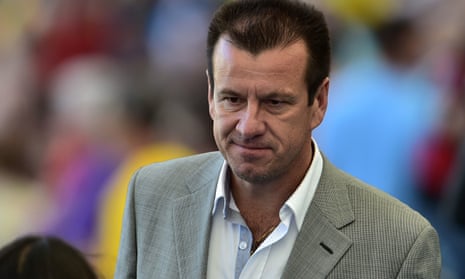Brazil’s pathetic and cringe-inducing surrender at the World Cup – first against Germany and then again against Holland – showed the locals that it was time to return to the drawing board. Amid the debris there seemed to be a consensus that wholesale changes were necessary.
The 7-1 defeat against Germany was such a shocking result that there were even suggestions that the Brazilian football confederation would appoint a overseas manager for the first time in the team’s 100-year history. Whatever happened, everyone agreed that there was time for a fresh approach.
So what does the CBF do? It only goes back to the past to reappoint Dunga. It beggars belief. The 54th managerial change since the Seleção job was created in the 1920s will not only mark the 12th time a coach returns to the seat, it will also mark the resurrection of one of the most controversial figures to have occupied the post. The 1994 World Cup-winning captain has been charged with giving Brazil some purpose again. For the record, yes, that is the same Dunga who left the job in disgrace four years ago.
Where can one start? A good first step is the fact that the former Seleçao hero has hardly covered himself in glory since leaving the job – by the way the first managerial position he occupied. Only after a two-year sabbatical did Dunga have another go, taking charge of the southern Brazilian side SC Internacional, the club where he made his breakthrough as a player in the early 80s. The experience lasted less than a year and until recently Dunga’s main comeback chance had been a financially tempting offer to lead Venezuela in a vain bid to end their status as the only South American side never to have played in a World Cup finals.
It is probably fair to add that Dunga’s first stint as Brazil manager was not an abject failure by any normal standards. With 42 wins and 12 draws in 60 games, the man nicknamed after the Brazilian version of Dopey, the least noble but much-loved of the Seven Dwarfs, oversaw the 2007 Copa América and the 2009 Confederations Cup titles, alongside Brazil’s first topping of the South American qualifiers in their league format. Victories included drubbings of Argentina and Italy. Even the Seleçao’s 2-1 defeat by Holland in South Africa in 2010 did not look that bad after they put on a first-half display that could and should have ended that quarter-final at Port Elizabeth.
His team did not play beautiful football, but that had hardly been a problem until the moment the manager seemed to have no response to his team’s poor defending against the Dutch. The main issue is that a few years before that July afternoon in South Africa, Dopey had turned into Grumpy.
Just as in 1994 he used the privilege of lifting the World Cup trophy as an opportunity to address in expletive terms how he felt about media criticism – four years before, he had been unfairly singled out for Brazil’s tepid display in Italy – Dunga the manager also adopted a siege mentality that trickled down to his players and made his side one of the less loved in recent history, a feeling that even the presence of players with a far different, more light-hearted image such as Kaká and Robinho were not able to alleviate the atmosphere surrounding the group. It did not help that Dunga showed a very dismissive attitude towards Neymar, who in 2009 was already the hottest young prospect in a Brazilian football. The manager chose instead not even to include the youngster in the 23-man squad in South Africa.
Dunga’s particular feud with Globo TV, the most powerful player in the Brazilian media landscape and for years a privileged partner of CBF, became a public war of attrition that had inevitable consequences to how he and his players behaved. Even evangelical golden boy Kaká managed to get sent off in a World Cup marred by the red card received by Felipe Melo, a midfielder moulded as a carbon copy of Dunga’s midfield enforcing style on the pitch.
So this is the man Brazilian football authorities think is the best name to lead Brazil into a journey in which they need to slay dragons with banged armours and broken swords. But after CBF announced last week that Gilmar Rinaldi, the former Selecão goalkeeper and players’ agent, was to take over the technical director role, few could be shocked to discover that Brazil were not really promoting a big change in course after their gruelling domestic World Cup heartbreak. Burned as he was after being so badly caught out by counterparts such as Joachim Löw and Louis van Gaal, the departing manager Luiz Felipe Scolari at least had a CV that included the 2002 World Cup.
“Created” in 2006 as a Brazilian version of the German experiment with Jürgen Klinsmann in that year’s World Cup, Dunga proved to be a budget version limited to national pride and a respectable image, lacking above all Klinsmann’s ability to learn from mistakes and to leave a legacy to his country. He now has a second chance that even the former captain himself must have felt was never coming back his way.
He had better make the most of it. Or risk having a direct participation in a decision-making process in Brazilian football which can only be described as shocking.
